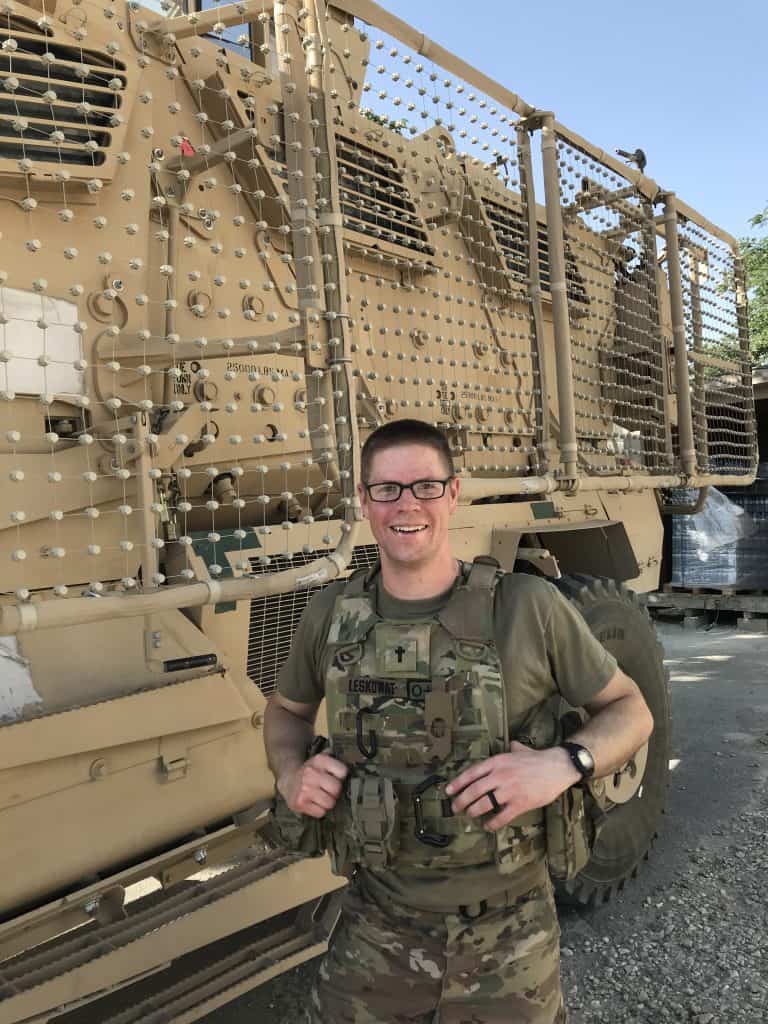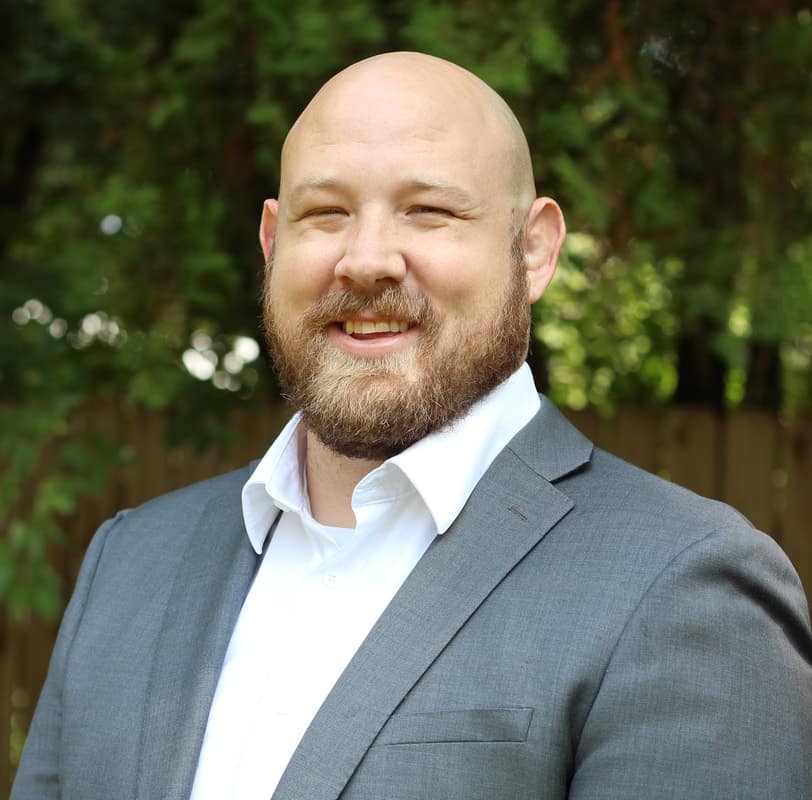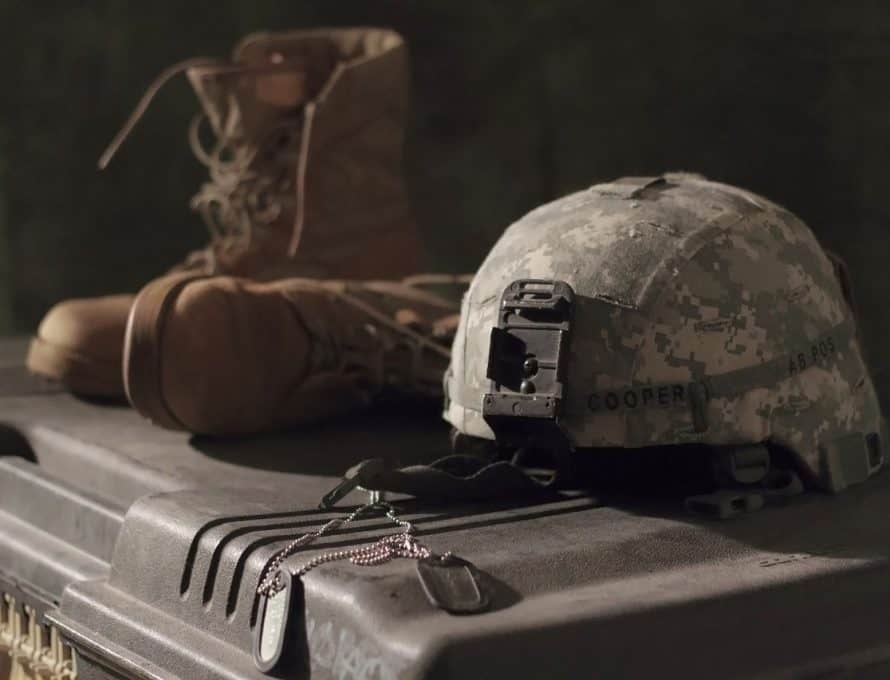JEFFERSON CITY – Every generation has moments that define them. For many, 9/11 was that defining moment.
As men and women immediately answered their country’s call to fight terrorism, many more would answer that call for the next nearly 20 years in Afghanistan, America’s longest war.

BAGRAM, Afghanistan – Michael Leskowat, shown at the Bagram Airfield here, was deployed to Afghanistan as a U.S. Army chaplain in 2019 and 2020. (Photo courtesy of Michael Leskowat)
Now that the U.S. military has withdrawn from Afghanistan, veterans from the war there are reflecting on their experience while emotionally processing through the controversy surrounding America’s withdrawal. Now serving as pastors, some of the veterans are seeking to help Christians respond to the crisis in Afghanistan.
Michael Leskowat, 2012 graduate of Southwest Baptist University and current pastor at First Baptist Church of Copan, Okla., was deployed in Afghanistan from October 2019 through July 2020 as Chaplain for the 329th Combat Sustainment Support Battalion. As a chaplain, Leskowat provided advisement on military ethics, morals, and morale. As a pastor, Leskowat helps his people think through the current Afghanistan crisis through both his preaching and his leading in corporate prayer.
“In preaching, I seek to apply the main points of our sermon texts to our current situations, including the Afghanistan crisis….[In prayer] I try to model for our church how to pray.” When struggling to think through the Afghanistan crisis, Leskowat recommends taking every concern to the Lord – whether for the Afghan people, military members, or the persecuted church. He encourages Christians to “turn your concerns to prayer (Philippians 4:5-6).”
In addition to prayer, Christians can provide tangible help and hope for veterans who live among us. Leskowat suggests getting to know veterans and lovingly helping them see God in the Afghanistan crisis. He recommends remembering that veterans are people in need of a Savior.
Remembering the humanity of veterans is the key to building genuine relationships, says another veteran, Josh Holler. Though not deployed to Afghanistan, Holler was deployed twice to Iraq between 2007 and 2009 serving with the 1st Battalion 7th Marine Regiment. Now a church plant resident aspiring to plant a church in St. Louis, Holler has written a book on understanding and helping veterans, Redeeming Warriors: Veteran Suicide, Grieving, and the Fight for Faith.
According to Holler, the “prominent and underlying cause for veteran suicide is our misunderstanding of community.” Christians and churches can uniquely provide a compelling community for veterans by genuinely showing interest through authentic relationships. “You don’t need to treat them [veterans] like they’re some wounded duck to be coddled – get to know the whole person, not just some details that sound exciting.”

Josh Holler
Holler recommends a four-step process for caring and loving veterans; (1) genuine greeting (real conversation); (2) choose better questions (not just about combat); (3) choose better settings (context that’s conducive for conversations); and (4) hear the veteran’s whole story. Intentionality goes a long way to show veterans that they matter, are valued, and can have hope in community with Christ followers.
While God may not give every Missouri Baptist church an opportunity to directly impact the Afghanistan crisis, He has given us opportunities to help those struggling the most in our communities. Though Missouri Baptists might not be able to physically help the persecuted church in Afghanistan, God has given us opportunities to entrust our brothers and sisters in Christ to the Lord as we fervently pray for their wellbeing. And though God might not have called you to a military battlefield, He’s giving us opportunities to help veterans around us through kindness, compassion, and intentionality in pointing them to Christ. May we as Missouri Baptists skillfully care for veterans among us by “admonishing the idle, encouraging the fainthearted, helping the weak, [and] being patient with them all.” (1 Thessalonians 5:9)
If you know or suspect a veteran is in crisis, contact the Department of Veterans Affairs Crisis Line at 1-800-273-8255 and press 1.

